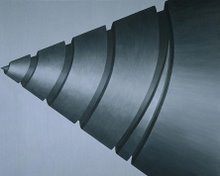HERZOG ON KINSKI - From 'Herzog on Herzog' edited by Paul Cronin
[...] Kinski and I complemented each other in a strange way. It is certainly true that I owe him a lot, but also that he owed me a great deal too, only he could never admit it. It was very fortunate for both of us, fortunate for me that he did a film like Aguirre and fortunate for him that I took him seriously as an actor. You look at his filmography, something like 200 films, and you know exactly what I am talking about. He was totally reckless with his own possibilities. He respected and truly liked me, but he would never admit that in public. On the contrary, he would heap the wildest expletives over me, which has a very funny side to it.
[...] Though we worked together five times, I never saw him as some kind of doppelgänger. we were similar in many ways, and I think the reason he returned again and again to work with me was because we shared a real passion for our work. I suppose you might argue he was my screen alter ego, but only because all the characters in my films are also close to my heart. Maybe he was as much a doppelgänger for me as I was for him. it is hard to explain, but Kinski had always wished he could direct, and he really envied me for certain qualities that I had. He wanted to articulate certain things that were brooding inside of him but was not able to do. [...] I could see through him like no one else could. I knew what was there and what could be mobilized and articulated. Whenever he really got going, I would get the shooting underway as quickly as possible, and often we managed to capture on film something unique. Sometimes I would even provoke him so he ended up shouting and screaming for a couple of hours, after which he would be so exhausted and in the right mood, very silent, quiet and dangerous. I did this for the speech in Aguirre when he calls himself 'the Wrath of God'. He wanted to play the scene screaming with real anger while I wanted him almost whispering, so I provoked him and after a particularly vicious tantrum he was literally foaming at the mouth and utterly exhausted. Then I insisted we start shooting, and he did the speech in one single take. So sometimes I had to trick him into a performance, though he always believed he was doing it all himself. I knew how to nudge him, even trick and cheat him, just to get the best possible performance out of him.
The way I communicated with Kinski was rather strange. A lot of the time we did not even use words, almost like a set of identical twins. During the making of Fitzcarraldo we did a take where everything was just perfect, the camera and sound were flawless, the actors did not make a single mistake and Kinski was great. But I would say to him, 'Klaus, I think there is more to this. Turn the pig loose.' and somehow he knew what I was talking about, and I would roll it again and he would go straight into something new, something totally exceptional. Whenever I saw him go into one of those wild things. [...] And sometimes, even though the scene was coming to a close, I would not call 'cut', but let the camera continue rolling to see what might happen because I would see that Kinski was up to something. Kinski would kind of look at me out of the corner of his eye, instantly sense I was not going to stop the camera and of course the whole thing would just explode and get even wilder and better than anything that had come before it. This synchronicity was quite incredible sometimes, and there were many times when we would communicate almost through these kinds of currents. I knew his hysterical energy and his so-called insanity, bring them to life before the camera. He felt safe working with me, and the closeness between us became such that we almost changed roles; I felt that if necessary I could have played the role of Fitzcarraldo, though not nearly as well as he did.
[...] (Do you miss him?) Maybe very rarely, I have to admit, but my relationship with him had ended some years before he died. There were moments in Cobra Verde that I will never forget. The final scene where he tries to push the boat out into the ocean is full of such despair, and Kinski is magnificent as he collapses into the water. But I knew at the time we could go no further after the film, and I told him so. There was nothing I would like to have discovered with him beyond that which I had already discovered in these five films. He had certain qualities I sensed and that we explored together, but anything beyond Cobra Verde would have been repetition.
The final scene of Cobra Verde was the last day of shooting that we ever did together. He had put so much intensity into this final scene that he just fell apart afterwards. Even at the time we both sensed it, and he even said to me, 'We can go no further. I am no more.' He died in 1991 at his home north of
Edited by Paul Cronin
Faber and Faber, 2002.







No comments:
Post a Comment